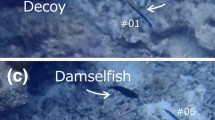Abstract.
Monogamy is thought to occur when the opportunities for polygyny are constrained by strong intra-sexual competition, or when two individuals are needed to defend a territory, or to feed or defend their young. In Eretmodus cyanostictus, a monogamous cichlid from Lake Tanganyika, parents do not feed young and each sex is capable of caring for all the offspring alone. We used a series of field-based removal experiments to investigate what other factors may select for monogamy. We found that single individuals usually retained their territory and gained new mates quickly. Thus, it does not seem to be mate availability or the need for a pair to defend a territory per se that maintains monogamy in this species. However, the new mates of widowed individuals were smaller than the original mates had been, and single fish were not capable of taking over empty territories. Single females remated faster than males and had to significantly increase their defence behaviour as singletons. Thus we argue that monogamy results from the need to guarantee a high quality mate and territory in a competitive environment.
Similar content being viewed by others
Author information
Authors and Affiliations
Additional information
Electronic Publication
Rights and permissions
About this article
Cite this article
Morley, J.I., Balshine, S. Faithful fish: territory and mate defence favour monogamy in an African cichlid fish. Behav Ecol Sociobiol 52, 326–331 (2002). https://doi.org/10.1007/s00265-002-0520-0
Received:
Revised:
Accepted:
Issue Date:
DOI: https://doi.org/10.1007/s00265-002-0520-0




